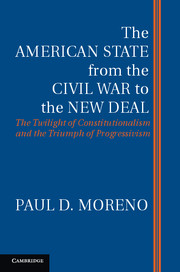 The American State from the Civil War to the New Deal
The American State from the Civil War to the New Deal Published online by Cambridge University Press: 05 May 2013
THE BRANDEIS NOMINATION
Wilson began to rally progressive forces for the 1916 election with his dramatic nomination of Louis Brandeis to the Supreme Court in January. Wilson’s first Court appointment, James C. McReynolds, turned into one of the nemeses of the New Deal. Most accounts attribute Wilson’s choice of McReynolds to inattention, or his desire to kick a politically troublesome attorney general upstairs. But Wilson had reason to believe that McReynolds was a genuine progressive, particularly due to his antitrust record. The only progressives who disapproved of the nomination were those who called him insufficiently aggressive in railroad and oil cases. Brandeis himself endorsed McReynolds, writing that “I have the highest opinion of his ability and character and should think the country would indeed be fortunate to have him” as Attorney General. Wilson’s decision seems to have been hasty, in the midst of severe distraction due to the recent death of his wife and the outbreak of war in Europe. Ray Stannard Baker later claimed that Wilson had told him that he came to regret the choice, but no other evidence corroborates this. The infamously irascible and bigoted McReynolds became the least collegial justice in the history of the Court.
The Brandeis appointment stunned the Senate and set off a firestorm of protest. Ex-president Taft, who had long sought to serve on the Court himself, and whom Brandeis had exposed antedating a report during the Pinchot–Ballinger controversy, was especially bitter. In a private letter, Taft called the appointment “one of the deepest wounds that I have had.” He called Brandeis “a muckraker, an emotionalist for his own purposes, a Socialist. . . a man who has certain high ideals in his imagination. . . of great tenacity of purpose and, in my judgment, of much power for evil.” Taft joined several past presidents of the American Bar Association who protested the nomination. Brandeis’ supporters, fearful that an immediate vote would defeat the nomination, conducted for the first time an extensive set of hearings on a judicial appointment.
To save this book to your Kindle, first ensure no-reply@cambridge.org is added to your Approved Personal Document E-mail List under your Personal Document Settings on the Manage Your Content and Devices page of your Amazon account. Then enter the ‘name’ part of your Kindle email address below. Find out more about saving to your Kindle.
Note you can select to save to either the @free.kindle.com or @kindle.com variations. ‘@free.kindle.com’ emails are free but can only be saved to your device when it is connected to wi-fi. ‘@kindle.com’ emails can be delivered even when you are not connected to wi-fi, but note that service fees apply.
Find out more about the Kindle Personal Document Service.
To save content items to your account, please confirm that you agree to abide by our usage policies. If this is the first time you use this feature, you will be asked to authorise Cambridge Core to connect with your account. Find out more about saving content to Dropbox.
To save content items to your account, please confirm that you agree to abide by our usage policies. If this is the first time you use this feature, you will be asked to authorise Cambridge Core to connect with your account. Find out more about saving content to Google Drive.